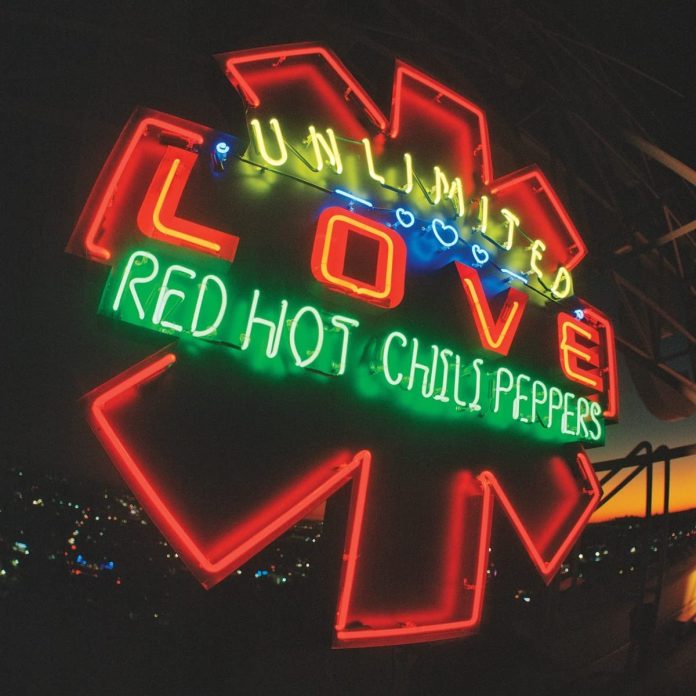Andy Knox
Staff Writer
Flea is, for good reason, one of the most influential bassists in the genre of rock. Chad Smith has a smooth, precise drumming style, while still being full of energy when it is called for. Anthony Kiedis has an unforgettable voice and lyrics that switch between cool-sounding nonsense and cryptic but profound. They always share a certain intangible, unique mesmerizing quality. John Frusciante is a terrific backup vocalist with an amazing minimalistic and freestyle playing guitar. The world is lucky that all four of these passionate, incredibly skilled musicians came together over 30 years ago, and even luckier that they continue to release great music in 2022.
Their newest project, Unlimited Love, marks the first time guitarist and vocalist John Frusciante worked with the group in over fifteen years. This is great news for fans; though Frusciante took multiple hiatuses throughout the band’s life, he plays an integral role in all of their best projects. Though cleaner and more professionally produced than ever, Unlimited Love has the core elements of everything that make a great RHCP record.
It begins with the instant classic, “Black Summer.” The opening lines, “A lazy rain am I, the skies refuse to cry / Cremation takes its piece of your supply,” are beautifully written and somberly sung. The lyrics, some about the regular summer wildfires that ravaged both America and Australia in recent years, are a master class in writing political messaging into songs without sounding preachy or boring. On the instrumental side, it takes only three seconds of listening to figure out that Frusciante is back on guitar, his minimal and wailing guitar quality being unique to him.
In an impressively natural way, the album showcases the strengths of each member; tracks like “Aquatic Mouth Dance” immediately open with the climbing, melodic, funky, domineering sort of bass riff popularized by Flea. This insanely groovy number also highlights the album’s relatively high production value; there are some subtle samples, like this whispery shout sample and zapping blaster sound effect played in the verses. The last-minute of the song has the band inexplicably joined by a jazz horn ensemble, which works shockingly well as each hornist goes ballistic on their instruments.
Songs like “The Great Apes” have a lot of Chad Smith-like drumming, in which he switches between a calm, syncopated drum during the soft, quiet chorus but brings the heat with some succinct but strong transitional drum fills that preview the next part of the song. Kiedis’s passionate cries of, “I just want the great apes to be free,” get the blood pumping and make the chorus a welcome earworm. Frusciante delivers an unusually intense distorted guitar solo with some clear ‘80s metal influence and then goes to play what feels like the rhythm guitar to Flea’s lead bass later on before finally ending with some strumming fast enough to remind the listener that he only uses five percent of his power on most tracks.
Though the album’s seventeen songs make for an hour and thirteen minutes’ run time, it does not feel so long. The poetic and subtle lyrics on “Whatchu Thinkin,’” combined with the rolling guitar riff in the chorus make this track another memorable highlight. Tracks like “These Are the Ways’ contain a mixed-up basket of the styles RHCP like to include in their music; the slow, minimal verses sound almost like country music while the chorus switches to energetic rock, and the post-chorus sounds like serious heavy metal.
Funky head-nodders like “One-Way Traffic” and “Here Ever After” showcase Kiedis’s propensity for some fun, wacky lyrical flows on the verses that show the band doesn’t take themselves too seriously. This is not to mention “Poster Child,” in which the band plays what feels like an updated, funky version of Billy Joel’s corny but frustratingly catchy hit song “We Didn’t Start the Fire.” The calmer, more meditative songs on the record, including “White Braids & Pillow Chair,” “It’s Only Natural,” “Not the One,” and “Tangelo,” highlight Kiedis’s beautiful lyricism and the band’s propensity for variety in sound and emotion.
Though every song is good and many are great, the album feels more like a return to form for the band than an instance of them seriously pushing themselves, and the project as a whole feels more like a collection of songs they wrote around the recording process than a cohesive, conceptual experience. While the average song on this album is great, there is not much to distinguish it from their work around twenty years ago.
There is some subtle auto-tune on most tracks, and it is a bit too obvious in a few, notable examples being “The Heavy Wing,” “Here Ever After,” and “Not the One.” Finally, even the most exciting tracks lack the youthful mania displayed in their earlier work, though this observation is more neutral than negative.
Rating: 8/10











